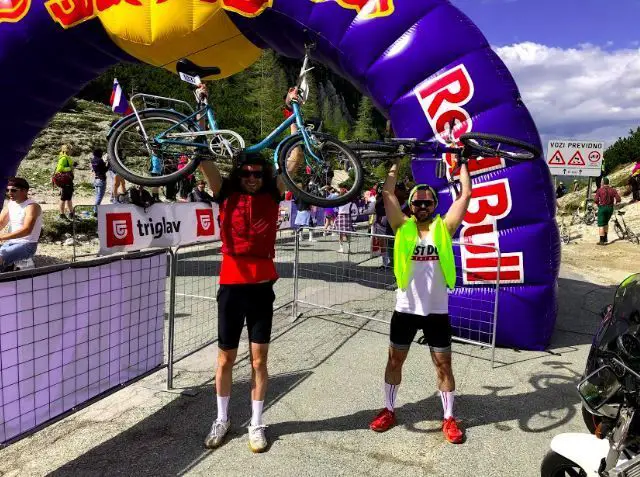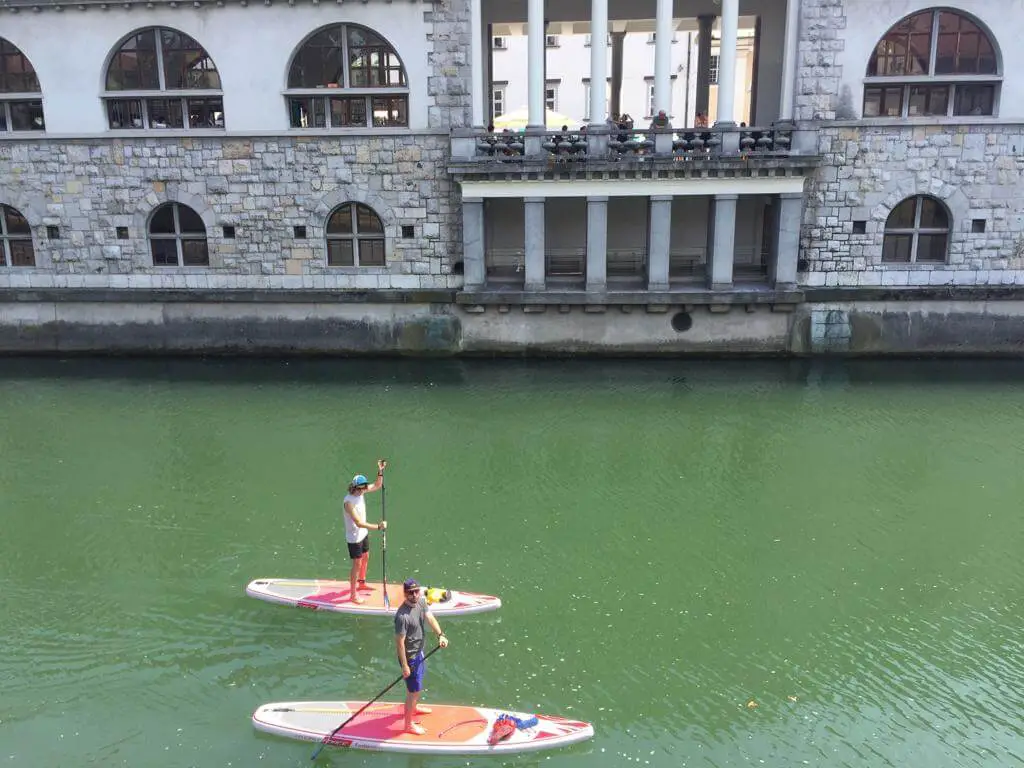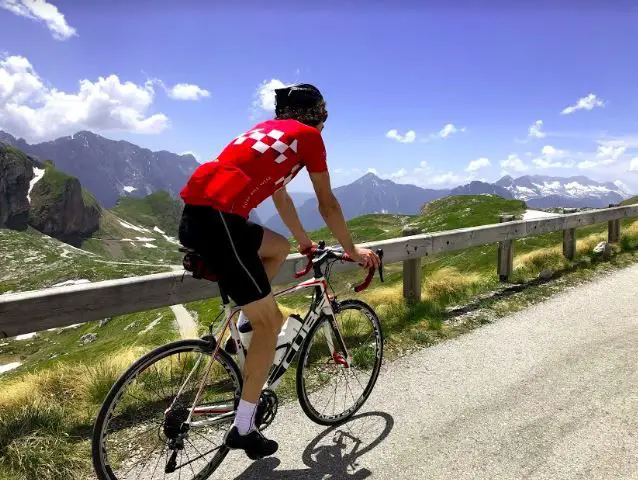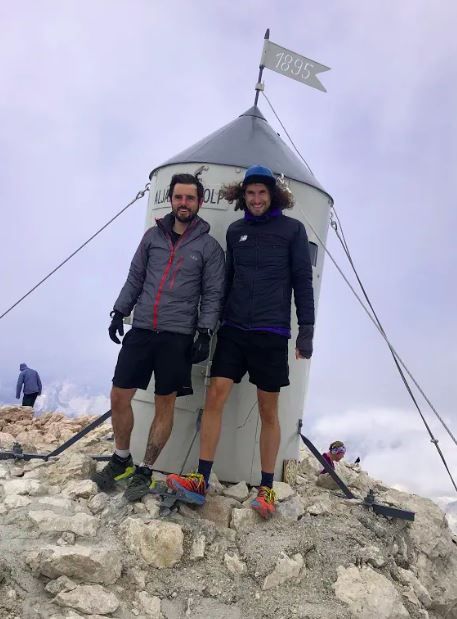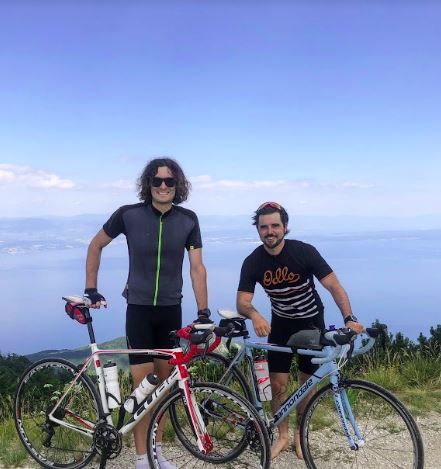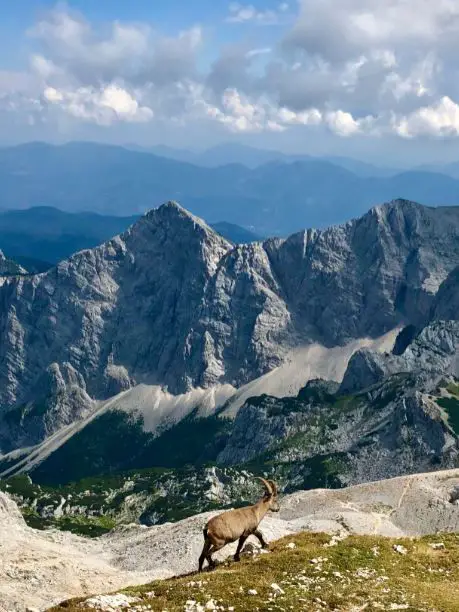News
STA, 27 August 2019 - Prime Minister Marjan Šarec and his Serbian counterpart Ana Brnabić confirmed the good relations between the two countries in Belgrade on Tuesday while also exploring ways to deepen both political and economic cooperation. Šarec reiterated Slovenia's strong support for EU enlargement to the Western Balkans.
There are no major open issues between the two countries, they are important economic partners and trade is expected to increase soon, said Šarec, who is paying an official visit.
While trade in goods already rose by 14% in 2018 compared to 2017 to exceed EUR 1.5 billion, Šarec said opportunities needed to be used both in the economy and in tourism.
His host Brnabić singled out Slovenia as one of the biggest investors in Serbia, with around 1,600 Slovenian companies active there. It is also a key foreign investor, she added, while expressing her expectation Serbian investment in Slovenia would grow too.
She labelled the total trade of EUR 1.6 million recorded in 2018 as impressive, but expressed hope it would exceed EUR 2 billion in 2020.
Brnabić also thanked Slovenia for its strong support for EU enlargement, while Šarec stressed Slovenia would insist enlargement needed to be addressed, even if "it is true that currently the climate is not very favourable for enlargement".
He added enlargement was a long process that required reforms, which in turn also required encouragement.
Implementation of the agreement on succession to the former Yugoslavia remains an open issue with Serbia, with a joint session of the two countries' governments seen as a chance to speed up the resolution of these issues. Brnabić expressed hope the session could be held before the end of the year.
The idea is to combine the joint session - such sessions have been organised since 2013 and the last one was held in Slovenia at the start of 2018 - with a business forum.
The pair also touched on the stalled talks between Belgrade and Prishtina, with Brnabić thanking Šarec for the clear position that Kosovo's introduction of 100% custom tariffs on Serbian goods did not contribute to stability in the region and that the decision needed to be changed.
She pointed out that Slovenia's and Serbia's positions on Kosovo's independence differed. While Serbia understands Ljubljana's views, it is important for Belgrade that Slovenia also understand Serbia's position and that that it recognise that Prishtina is far from being a predictable partner.
Also commenting on the Slovenia-Serbia agreement governing the employment of Serbian workers in Slovenia which will enter into force in September, Brnabić said she did not expect the agreement to cause a major workforce outflow from Serbia. Its main purpose is providing for safety and protection of the workers, she said.
Šarec said Slovenia presently had record-high employment and needed additional workforce. He also stressed the importance of having a well regulated workforce flow, which is something that is provided by this agreement.
Šarec was also received by Serbian President Aleksandar Vučić and Parliamentary Speaker Maja Gojković, while he is also scheduled to meet Slovenians who are living or are active in Serbia.
According to the prime minister's office, Šarec talked with Vučić and Gojković about the current events in the EU and the situation in the Western Balkans.
Vučić thanked Šarec for Slovenia's support to Serbia in the process of EU accession, especially for the political, technical and expert assistance in individual negotiating chapters, added the office of the Serbian president.
While Vučić also emphasised Slovenia's importance as an economic partner, Šarec said that Slovenia supported dialogue between Belgrade and Prishtina as the country's interest was that the relations in the region were good.
At the meeting between Šarec and Gojković, the latter thanked Slovenia for its support to Serbia in the EU integration process, and noted that cooperation between the countries' parliaments was very intensive.
According to a press release from the Serbian parliament, Šarec assessed at the meeting that the cooperation between the countries was excellent, and pointed to the good cooperation between the countries' parliaments.
STA, 27 August 2019 - There has been a noticeable trend lately in Slovenian information and communication technology (ICT) companies being acquired by foreign buyers, with the acquirers seeing the Slovenian companies as strong players with good potential.
The assessment comes from Nenad Šutanovac of the Association of Informatics and Telecommunications, who has told the STA that the market is getting interesting both in terms of potential targets and supply.
According to him, there are many reasons for the owners of Slovenian ICT companies willing to sell. "Some owners are, for example, older and they are thinking about whether to enter the market transformation or to sell the company instead."
Šutanovac explained that finding new markets is an increasingly important thing for such companies, which may be a tough task for some. "This is especially true for companies which did not have a well-developed sale network in the past."
He believes that strengthening sale strategies and synergies on new markets are the two key advantages brought by foreign ownership. "Of course, development also requires capital, which is lacking in Slovenia," he added.
The biggest ICT takeovers in Slovenia
Among the most important takeovers, Šutanovac singled out Hermes Plus, which merged at the end of the 1990s with the Austrian IT consulting, solutions and services provider S&T to get the name S&T Slovenija.
"This company was positioned well not only in Slovenia, but in the entire region," he said, also pointing to the sale of the software company Hermes Softlab to the Serbian group Comtrade in 2008.
Among the more recent acquisitions, he mentioned NIL, one of the largest IT suppliers, which was taken over in February by the Danish company Conscia, a leading European producer of ICT infrastructure and advanced ICT services.
As the Ljubljana-based NIL told the STA at the time, there would be no major changes in the company after the acquisition, and all jobs would remain in Slovenia.
Furthermore, the management software maker Infotehna has been acquired by Amplexor of Luxembourg to be renamed Amplexor Adriatic, while the US company Emphasys Software has acquired Halcom, a provider of banking software solutions.
Listing a few more examples, Šutanovac said that ICT companies in the country were also attractive to Slovenian companies from traditional industries, including the energy company Petrol and the industrial conglomerate Kolektor.
As of recently, Adacta Services Business, a leading Microsoft Dynamics, Qlik and Cornerstone partner in Slovenia, Croatia and Serbia, has been in ownership of BE-terna, a company owned by the German Deutsche Private Equity fund.
The transaction does not affect the part of business related to the development and implementation of solutions for insurance companies, which will stay under the wing of the parent company Adacta Holding.
According to Šutanovac, many companies see special potential in solutions for insurers and thus do not want to leave that market. "Opportunities for small companies in other fields are rather limited, so they tend to sell other segments."
He believes that even in the case when an ICT company is acquired by an equity fund, strategic development of the company is not necessarily threatened. "Funds too can look for compatibilities in the content, and not only for short-term profit."
Šutanovac expects that the trend is likely to continue, but he would like to see "domestic capital be stronger and the ICT sector get solidified by the merging of homegrown companies".
ICT job opportunities in Slovenia
According to him, the fate of the sector in Slovenia highly depends on the availability of staff, which have become pretty mobile in this field due to the globalisation of the ICT industry.
"What is more, the number of young graduates in Slovenia cannot meet the demand, and members of our association are looking for staff abroad, not only in the former Yugoslav republics, but also in Poland and Ukraine."
He added that Slovenia should focus on developing complex expertise and solutions and on innovation. "There is a lack of experts, but we have a high level of knowledge and high productivity and quality of software development."
STA, 26 August 2019 - Infrastructure Minister Alenka Bratušek highlighted the need for Slovenia to remain at the cutting edge globally when it comes to the transition to clean energy, as she addressed the European Conference of the International Association of Energy Economics on Monday.
Na @EFLjubljana poteka evropska konferenca Mednarodnega združenja za energetsko ekonomiko #IAEE. Ministrica @ABratusek je na otvoritvi poudarila, da ima Slovenija enega najboljših energetskih sistemov na svetu in da se bomo @mzi_rs potrudili, da bo vsaj tako dober tudi v bodoče. pic.twitter.com/dbnzh5hxNn
— Ministrstvo za infrastrukturo (@mzi_rs) August 26, 2019
"Slovenia is among the best and we plan on keeping it this way," she said in reference to the country placing 6th among 125 countries in the World Energy Council's Energy Trilemma Index.
She said users will play a bigger role in energy generation in the future, as will smart grids. Public transportation will have to be strengthened and buildings insulated.
"Some of the measures are free, but in most cases the path to decarbonisation will be expensive. Financing of the transition should be the key issue," she said.
Bratušek also noted that in the transition to carbon-neutral energy sources, Slovenia will have to be mindful to keep energy accessible to all citizens.
The minister delivered the address at the 16th European Conference of the International Association of Energy Economics (IAEE), organised by the IAEE, the Ljubljana School of Economics and Business and the Slovenian Energy Economics Association.
Through Thursday, the conference will feature debates on smart solutions, the future of gas and gas infrastructure, and geopolitical issues, including relations with Russia.
All our stories on energy in Slovenia are here
STA, 26 August 2019 - Boris Pahor, one of the most celebrated Slovenian writers, turned 106 on Monday, celebrating his birthday at what has become a traditional event at Ljubljana's Konzorcij bookshop.
A strong advocate of Slovenian identity and language, Pahor was born in Trieste in what was the Austro-Hungarian Empire, and still lives in this city in Italy.
He was a witness of Fascist violence against Slovenians, and survived a Nazi concentration camp, the experience he described in his celebrated novel Nekropola.
When it was first published in Slovenian in 1967, Necropolis was largely overlooked, but was in 1990 translated to French to critical acclaim.
Pahor took the opportunity of today's event to thank Slovenian philosopher Evgen Bavčar for his efforts for the French translation, which was followed by translations into a number of other languages.
"Today Nekropola is a world-famous novel," said Pahor, referring to himself as "a pilgrim among shadows" as is the title of the French translation.
Still considering himself "a citizen of the concentration camp", he said he had first visited the former "concentration camp some 50 kilometres from Salzburg where doctors dissected Jews to see if their brain is any different from that of European people", ten years after the end of the war.
Pahor has dedicated his life to warning about the pitfalls of totalitarian regimes and to promoting confidence based on a good knowledge of history and one's own identity.
Writer Peter Kovačič Peršin said Pahor had started writing as "an apostle of Sloveneness in an environment which is still not fond of him", and as "a messenger" who also wanted to revive the awareness of Slovenian identity and freedom among Slovenians in Slovenia.
"Your work has validated the greatness of Slovenian people, Slovenian national and Slovenian language," Kovačič Peršin told the packed bookshop, noting the love of the mother tongue was the recurring theme of Pahor's books.
Culture Minister Zoran Poznič praised Pahor as a witness who "draws attention to what went wrong in the 20th century so that it would not be repeated in the 21st century".
The head of the Slovenian Book Agency, Renata Zamida, said many abroad considered him the embodiment of literary creativity in Slovenia, while here he is considered the personification of national pride.
Many foreign journalists consider Pahor "a miracle of historical memory", Zamida said at the event, organised by Mladinska Knjiga and Cankarjeva Založba, and also attended by Minister for Slovenians Abroad Peter Česnik and Slovenian Senator in the Italian parliament Tatjana Rojc.
Pahor has received many awards and honours for his work, including the Prešeren Prize in 1992 and the Silver Order of Merit in 2000. In 2007, he was presented with the Legion of Honour, France's highest state order.
Check the date at the top of the page, and you can find all the "morning headlines" stories here. You can also follow us on Facebook and get all the news in your feed.
A schedule of all the main events involving Slovenia this week can be found here
This summary is provided by the STA:
Two illegal migrants sentenced for abducting elderly Slovenian
NOVO MESTO - The Novo Mesto District Court sentenced a 25-year-old Moroccan and a 18-year-old Algerian to 21-month prison sentences after they pleaded guilty to abducting a 79-year-old Slovenian near the Croatian border in May and using his car to get to Italy in a case that shocked the country. The pair apologised to the abducted man and to Slovenia, expressing remorse and arguing they had suffered from mental problems due to the long journey to Europe. The authorities are yet to determine whether the third alleged abductor is of age.
One year into term, govt under no pressure to take reforms
LJUBLJANA - Slovenia's first minority government, led by political novice Marjan Šarec, will enter its second year on 13 September with a relatively high approval rating. No major tensions have emerged among the five centre-left coalition parties, which enjoy an increasingly brittle support of the Left, but there have also been no major reforms. Analysts believe the high voter approval rating stems from low expectations and economic stability, which also mean the government is under no pressure to take reforms.
Poll: Govt approval down slightly but LMŠ remains on top
LJUBLJANA - The latest Mediana poll, released by POP TV on Sunday, showed a 5.6-percentage point drop in the voter approval rating for the Marjan Šarec government, which was however still backed by 51.6% of respondents. Šarec also remained the most popular politician and his LMŠ the most popular party, but the poll also showed the share of undecided voters rising to over 30%. The LMŠ lost 0.4 percentage points from July to 18.8%, while the opposition Democrats (SDS) in second lost 2.6 points to 15.5%.
Slovenia to remain at cutting edge in transition to clean energy
LJUBLJANA - Infrastructure Minister Alenka Bratušek highlighted the need for Slovenia to remain at the cutting edge globally when it comes to the transition to clean energy, as she addressed the European Conference of the International Association of Energy Economics. "Slovenia is among the best and we plan on keeping it this way," she said in reference to the country placing 6th among 125 countries in the World Energy Council's Energy Trilemma Index. Th conference is running until Thursday.
Youth in Slovenia protest over Amazon rainforest fires
LJUBLJANA - Some 100 young protesters gathered in front of the Brazilian Embassy on Monday to urge authorities to act as massive fires are raging in the Amazonia. Calls for Slovenia to block the trade agreement between the EU and Brazil and to join economic sanctions against Brazil could also be heard at the protest organised by the Youth for Climate Justice movement. Andrej Kurnik, a lecturer from the Ljubljana Faculty of Social Sciences, said "neither French President Emmanuel Macron nor Brazilian President Jair Bolsonaro has the right to deny Amazonia natives the right to their living environment, nor have they the right to deny us what we call the Planet's Lungs".
Business sentiment declines in August
LJUBLJANA - The business sentiment indicator for Slovenia deteriorated in August at both the monthly and annual levels, while still being above the long-term average. The indicator has been dropping since 2017, when it reached the second-highest level ever, the Statistics Office reported. Compared to July, the indicator was down 0.8 percentage points, while dropping 4.6 points year-on-year, with the lower sentiment in manufacturing (-2.5pp) having the biggest impact.
Regular petrol to get cheaper at midnight
LJUBLJANA - Regular petrol sold at service stations outside the Slovenian motorway network will get cheaper as of midnight, selling at 1.264 euro per litre or 2.8 cents less than so far. The administered price of diesel will stay unchanged over the next fortnight at 1.237 euro per litre, according to the Economy Ministry. The price changes do not affect other types of fuel or fuel sold at service stations along the motorways and expressways, as these are formed freely by the retailers.
Boris Pahor celebrates 106th birthday
LJUBLJANA - Boris Pahor, one of the most celebrated Slovenian writers, turned 106, celebrating his birthday at what has become a traditional event at Ljubljana's Konzorcij bookshop. A strong advocate of Slovenian identity and language, the Trieste-born author witnessed Fascist violence and survived a Nazi concentration camp, so he has dedicated his life and work to warning about the pitfalls of totalitarian regimes and to promoting confidence based on a good knowledge of history and one's own identity.
Skydiver Avbelj to be inducted into hall of fame
LJUBLJANA - Slovenian skydiver Irena Avbelj will be inducted into the International Skydiving Hall of Fame at a banquet at the March Field Air Museum in Riverside, California on 19 October. She is one of the ten athletes to be honoured for their innovation and outstanding achievement in skydiving in 2019. Avbelj won 20 gold, eleven silver and six bronze medals at European and world championships before she had to end her career due to grave injuries sustained at the 2011 European championships in Serbia.
Visiting Ljubljana? Check out what's on this week, while all our stories on Slovenia, from newest to oldest, are here
If you're learning Slovenian then you can find all our dual texts here
August 26, 2019
A summer school of philosophy titled “Fail better!” began this Monday with a week of lectures from Slovenia’s most prominent thinkers, also known as the “Ljubljana school of psychoanalysis”. In t week that follows, Mladen Dolar, Alenka Zupančič and Slavoj Žižek will present their views on the foundations of their thought as well as their current work to a maximum of 120 participants from 17 countries, most of whom are coming from Denmark and Germany. The three will meet to give lectures at their Alma Mater, the Faculty of Arts of the University of Ljubljana, and the working language of all the events will be English.
Žižek will present a series of lectures titled “Hegel with Neuralink”, which take as their entry point “Neuralink, an American neuro-technological company, founded by Elon Musk and eight others, dedicated to developing a mind-machine interface (MMI)”.
All our stories on Žižek are here, while a list of 70 quotes for his 70th birthay is here
Alenka Zupančič’s lectures are titled “The Real and Its Passions”, which as their “starting and focal point take the concept of the Real that emerged in psychoanalytic theory (Freud, Lacan)”.
Mladen Dolar will be speaking in a series called “What, If Anything, Is the Other?”, which “will attempt to explore the psychoanalytic notion of the big Other, given the paradox that on the one hand it is absolutely necessary and on the other, according to Lacan, it is lacking – how can it be both at the same time?.”
The University of Ljubljana is currently marking it’s 100 anniversary of existence which is being celebrated with 100 various events throughout the year. The summer school of philosophy is perhaps one of the most significant of events due to the global prominence of the authors who are going to present their thoughts together at the place of the beginning of their studies.
For details click here.
When we first heard about Ross Murray-Jones’ plan to swim, cycle and run from Piran to Triglav we had to know more, so we sent some questions that he was kind enough to answer.
Tell us a little bit more about Sea-to-Summit Slovenia. What is it exactly?
Sea-To-Summit Slovenia is a long-distance multisport triathlon from the Adriatic Sea to the highest mountain in the Julian Alps. After months of training and planning, this September, Chris Ryan and I will complete this never-before-attempted endurance challenge in under 24 hours. [ed. Sometime in the first or second week is the current aim, but it all depends on the weather]
Starting from Piran, we’ll paddleboard two-thirds of the Slovenian coastline to Koper before crossing the country by road bike, through the capital Ljubljana and passed world-famous Lake Bled, finishing with a climb to the summit of Triglav at 2,864m.
That sounds tiring. How did you come up with the idea?
In February this year I competed in Red Bull’s Samo Gas ski cross race on Kanin. From Slovenia’s highest ski resort you can see container ships docking at Trieste’s Italian port in the Adriatic, and the journey from sea-to-summit seemed do-able in a day. So I approached the only guy I knew crazy enough to come along with me, Chris, an old friend from London. Over a few beers the original idea escalated quickly to include a sea leg, the peak changed to Triglav and the decision was made to keep within Slovene borders only, adding an extra 100km onto the bike ride. And thus Slovenia’s toughest ever triathlon was born.
Where are you from and have you ever done anything like this before?
Chris and I are both from London originally. We came to Slovenia as part of the launch of a ski tech business and fell in love with this small, charming European country. Slovenia is really a hidden gem and the quality of life is simply incomparable to anywhere else we’ve lived.
We’re both quite sporty and have ticked off a number of Slovenia’s best sports events already, from UTVV100 and the Ljubljana Marathon to IRONMAN 70.3 Slovenian Istria and Red Bull’s infamous Goni Pony. However this new challenge takes us both to the next level: a 24-hour non-stop event.
Twenty-four hours is a long time indeed - how did you train for this challenge and did you pick up any injuries along the way?
The first problem was that although I’d kayaked 1,300km around an island in the Philippines a few years ago, I’d never really paddle boarded before and neither had Chris. Luckily, we teamed up with Slovenia’s SUP race team this summer, Tiki Team, who quickly taught us the basics over weekly training sessions. This was combined with time on the saddle: 100km+ bike rides from Slovenia into Croatia, Italy and Austria and even up to Mangart, Slovenia’s highest road as well as long trail days to the summits of Grintovec, Stol and Triglav.
Fortunately, my weekly appointments with Fizio Tri in Kamnik and regular conditioning sessions with JD Coaching in Ljubljana have kept me injury free thus far. My only serious incident happened recently on a morning bike ride around Vis Island, Croatia when unfortunately I came into contact with a dog and went straight over my handlebars; this has kept me off the bike the last few weeks.
Can you talk me through the various stages of the challenge, and will you take any breaks?
The Sea-To-Summit Slovenia is a multisport triathlon so there are three distinct stages to complete in under 24 hours covering 219km and 4,400m of elevation.
Stage 1: 15km paddleboard from Piran to Koper.
Stage 2: 190km road bike from Koper to Krma. 2,400m of elevation.
Stage 3: 14km trail run/climb from Krma to Triglav. 2,000m of elevation.
The 24-hour deadline is really tight, leaving little margin for error, but we have factored in a 20-minute rest break every three hours to check equipment, stretch, change clothes and take on board solid nutrition as required.
What parts do you expect to be most challenging?
Whatever we have to do in the dark will be tough. After careful consideration, we decided the bike would be our best choice given our relative inexperience on the paddleboard and the inherent dangers of climbing the country’s tallest mountain at night and tired. By starting at midday, we plan to reach Triglav Glacier in low light the next morning before making our summit bid on a rising sun.
Weather, especially wind, will also play a big factor in whether we’re able to finish the challenge in time. To mitigate this concern, we’ve given ourselves a five-day window in early September to minimise the chance of any big waves, crosswinds on the road or unsafe conditions high up on the mountain.
Will you use any special equipment?
A friend of mine is on Bestway’s SUP team and so we’ve both got a Bestway Hydro-Force Fastblast Tech SUP for Stage 1. For Stage 3, our friends over at Hoka One One have also kitted us out with a Speedgoat 3 trail running shoe for Chris and Sky Arkali hiking shoe for me so we have the right footwear for the job. Other than that we have invested in safety equipment such as bike lights, helmets and Personal Flotation Devices alongside various other bits and bobs such as MSR Dynalock Ascent poles and a Quad Lock for my iPhone X to make navigation easier.
Any idea what you’ll eat the day before, and on the day?
We'll likely burn through 20,000 calories so nutrition is definitely ‘Stage 4’, an absolutely key part of the challenge to prevent bonking (the curse of any endurance athlete).
We’ve devised a custom nutrition plan which starts 48 hours prior with spaghetti bolognese. The night before is an opportunity to carb up an extra 2,000+ calories with a large pepperoni pizza, and on the morning of the event, two eggs on brown bread with butter and a peanut butter and jelly sandwich with a banana and coffee should get us going. Delicious!
On the day, we'll drink just under a litre per hour on average mixed with electrolytes to maintain salt and mineral levels and then consume on-the-go snacks every 45 minutes, such as potica. It’s important to eat proper food too, so we’ll stop for Štruklji or prosciutto, pickles and cheese sandwiches at predetermined locations. And just in case, we’ll load up the support van with extras we might crave such as Red Bull, Calipo’s and salty olives!
So you’ll have people following you?
Yes, we'll have a support crew consisting of our very understanding partners to help us along the way. Without them, the challenge would simply be impossible from a logistical perspective given the need to switch equipment multiple times and take on nutrition in the dead of night.
If you’d like to follow us on the day, you can find us on @rossmurrayjones or @chrisryan00b. We’ll also release a short video post adventure documenting the journey so watch out for that.
At this point I should probably ask why are you doing this?
Chris and I really wanted to showcase the beauty and diversity of this country we’ve grown very fond of. Over the course of 24 hours, we’ll go from sparkling sand and blue waters through to medieval towns and glacial lakes before finishing up in the snowy peaks of the southern alps. Slovenia is really one of Europe’s leading outdoor adventure destinations and we wanted to highlight this in our own unique way.
More personally, I find pushing my limits gives me a deep sense of purpose and satisfaction. Success in life requires passion, grit and determination, and Sea-To-Summit embodies all of these aspects in one. And if we can inspire even just one person that it’s possible for ordinary people to do extraordinary things than that would be great too.
Finally, what’s the worst thing about living in Slovenia, and what’s the best?
The best is definitely the quality of life. The country itself packs a real punch in terms of its beauty, safety and kindness of locals. Moreover, within two hours you can be sailing in Croatia, skiing in Austria or eating a pizza in Italy. It’s incredibly diverse. And the worst has to be that Slovene is a very difficult language to learn and there unfortunately isn't a huge amount of material available to help. No Duolingo for now! Luckily, most Slovenes are very proficient in English. In fact, I’d even say some Slovenians knowledge of English would put us lot back in Britain to shame.
STA, 26 August 2019 - Kranjska Gora is introducing the first electric mountain bike network in Slovenia to promote sustainable mobility. Cyclists will be able to rent the bikes in nearby Gozd Martuljek and in the centre of Kranjska Gora.
Cycling is a very popular way of exploring the Upper Sava Valley. According to the local tourist information centre, it is the perfect way to experience what the Alpine destination has to offer.
"The Upper Sava Valley offers beautiful cycling routes under the shade of trees from the starting point Topolino in Slovenia across the Rateče border crossing to the Friuli Venezia Giulia region in Italy where you can see beautiful mountain peaks," they say.
Apart from promoting the idea of sustainable tourism and e-mobility, the mountain bike network offers an easier way to explore rugged areas and overcome long distances.
Kranjska Gora will be the first to establish the network of e-bikes in Slovenia in cooperation with the company Alp Adventures. Cyclists will be able to rent a custom-made bicycle via a mobile app Green4rent at the cost of six euro an hour or 39 euro per day.
The bikes will be initially available for rent at the Špik campsite in Gozd Martuljek and at the Alp Adventures rental shop in the centre of Kranjska Gora.
Next year, the municipality will expand its network by improving the system and setting up new renting spots. According to the director of the Kranjska Gora Tourist Board Blaž Veber, their wish is to offer the combination of bicycles and tourist buses in the future.
The tourist board included all the possibilities of public transport in the area of Julian Alps in one brochure this year.
"It will be very useful to our visitors because there are many transport possibilities in this area and we had not been able to get all the information about routes, prices, frequencies and stopping points in the past," explained Veber.
If you have finished high school, are fluent in Slovenian, have knowledge of English and basic comprehension of another language, as well as good health and fitness, then you have the opportunity to apply for a job as one of the Ljubljana-based cabin crew for Adria Airways.
The positions are full time, open to applicants with from 0 to 1 year of work experience, and the deadline to send in your CV is 22 September (2019). More details – in Slovenian – can be found here.
STA, 26 August 2019 - A 25-year-old Moroccan citizen and 18-year-old from Algeria pleaded guilty in Novo Mesto on Monday to abducting a 79-year-old man near the Croatian border in May and using his car to get to Italy. They were each handed a 21-month prison sentence, which is in line with the plea bargain.
The two apologised to the abducted man and to Slovenia, expressing remorse and arguing they had suffered from mental and physical problems due to the long journey to Europe. The Algerian said he had left his home country in September 2018 and the Moroccan in December.
The pair have been in detention since 10 May together with another Algerian, whose age however remains to be determined by the authorities. He claims to be a minor even though he stated he was 18 when he initially applied for asylum.
Novo Mesto District Court judge Betka Šimc handed the pair nine months each in prison for robbery, seven for abduction and six for car theft to confirm a combined sentence of 21 months.
She assessed the plea bargain as favourable for the defendants, saying the prosecution had probably considered their young age. Still, their youth cannot serve as an excuse, she added, noting they had left their countries out of fear for their life while they ended up putting another man's life in peril.
After serving the sentence they will be deported from Slovenia and will not be allowed to ask for re-entry for five years.
They will moreover need to pay the local man EUR 213 in damages to cover the costs of a replacement car he used after the incident in which his car was damages.
The man was seeking EUR 50,000 in damages from the two for the fear and health-related consequences suffered but the court asked him to seek the damages in a civil lawsuit, arguing proving the remaining damage would protract proceedings excessively.
A group of migrants - the reports suggested four men - tied up the man in his vineyard near the south-eastern town of Črnomelj on the border with Croatia on 8 May. They put him into the boot of his car and then drove around Slovenia for several hours.
The abductors stopped the car near a village close to the town of Sežana on the south-western border with Italy, untied and released the man, and proceed on foot to Italy. They were arrested there by Italian police and handed to Slovenia.
Under Slovenia's penal code, abduction carries a prison sentence of six months to ten years, or less if the abductor releases the victim of their own accord, whereas theft carries a sentence of up to two years.
The incident, which came amid a continuing flow of migrants through Slovenia, stirred the country and also marked the campaign for the 26 May elections to the European Parliament.
Security measures on the border with Croatia have been stepped up since and mixed patrols have been introduced on the border with Italy.
Related: Abduction Suspects Detained, Analysts Fear Incident Will Spur Anti-Migrant Populism
STA, 12 August 2019 - Slovenia will be the country in focus at viennacontemporary 2019, the largest international art fair in Austria, which will take place in Vienna from 26 to 29 September.
The fair will feature more than 100 galleries and 500 artists from 25 countries, providing a glimpse into the contemporary art scene in Central and Eastern Europe.
In focus will actually be a state without territory, the NSK State in Time, an ongoing project launched by the controversial Neue Slowenische Kunst (NSK) art collective.
The virtual state debuted in 1992 as a reaction to NSK's own activities and to political developments following the fall of the Berlin Wall.
It emerged a year after Slovenia gained independence, showing the artists' disapproval of national borders and promoting transnationality.
The State in Time boasts more than 15,000 citizens with their own NSK passports from around the globe, who held their first congress in Berlin in 2010.
Find out how to get your passport here
"The situation in Europe and the world shows just how relevant the NSK State in Time still is," viennacontemporary curator Johanne Chromik said during a recent presentation of the art show in Ljubljana.
Chromik also said the Slovenian section of the show had been curated by Tevž Logar, an up-an-coming Slovenian curator and art lecturer, who had chosen 13 artists.
Four Slovenian galleries will also be presented in Vienna, namely the Photon Gallery, Fotografija Gallery, P74 Centre and Gallery, and the Ravnikar Gallery Space.
Viennacontemporary is foremost a platform for art galleries to get new contacts, at the same time fostering dialogue and research.
All our stories on NSK are here


